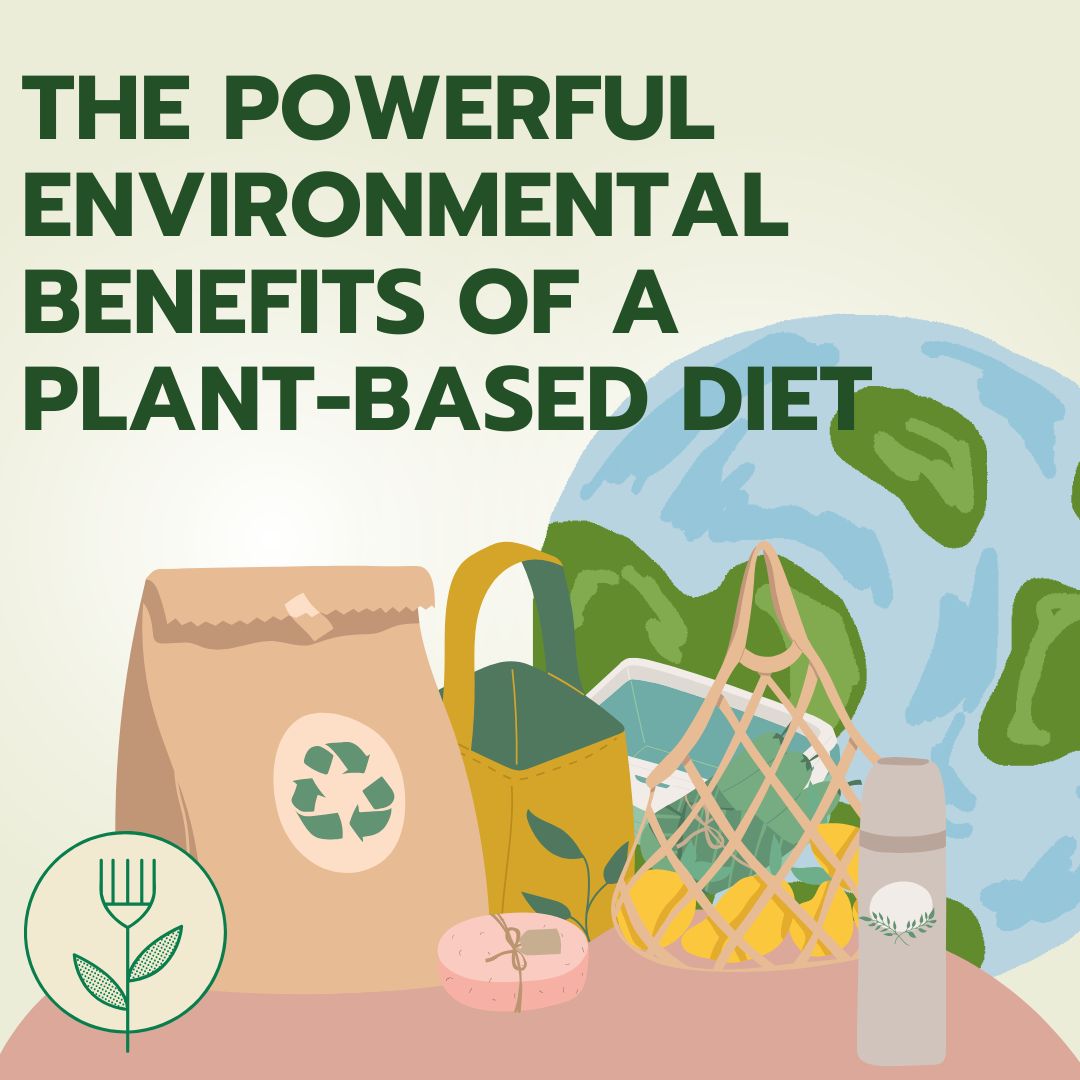Switching to a plant-based diet isn’t just good for your health — it’s great for the environment too. The environmental benefits of a plant-based diet are significant. Even small changes in what we eat can have a big impact. From cutting carbon emissions to saving water and protecting biodiversity, plant-based eating is an easy way to support sustainability.
How the Environmental Benefits of a Plant-Based Diet Make a Difference
An article from the YALE SCHOOL OF THE ENVIRONMENT highlights a study that examined the environmental benefits of a plant-based diet. The results were compelling! Plant-based eating reduces
- Heat-trapping gas emissions by 75%,
- Decreases water pollution by 75%
- And reduces land usage by 75% compared to meat-rich diets.
These findings emphasize just how much of a positive difference plant-based eating can make for the planet.
Reducing Your Carbon Footprint with a Plant-Based Diet
One of the most significant environmental benefits of a plant-based diet is its ability to reduce greenhouse gas emissions. Animal agriculture contributes significantly to carbon dioxide, methane, and nitrous oxide emissions — gases that drive climate change. By switching to plant-based foods, individuals can dramatically lower their carbon footprint, as plant-based meals require fewer resources and emit fewer greenhouse gases during production.
Preserving Water Resources: Key Environmental Benefits of a Plant-Based Diet
The water footprint of plant-based foods is much smaller compared to animal-based products. Producing meat, dairy, and eggs requires massive amounts of water for both animal care and growing their feed. On the other hand, plant-based eating can help conserve water, reduce strain on freshwater ecosystems, and alleviate the global water scarcity crisis.
Protecting Biodiversity through Plant-Based Choices
Animal agriculture is a major driver of deforestation and habitat loss, which threatens biodiversity worldwide. By embracing a plant-based diet, we can help reduce the demand for land-intensive livestock farming, thereby protecting fragile ecosystems and preserving the species that rely on them.
Navigating Environmental Concerns in Plant-Based Eating: Avocados and Almonds
While the environmental benefits of a plant-based diet are clear, it’s important to acknowledge that not all plant-based foods are equally sustainable. For example, the production of avocados and almonds has raised concerns due to deforestation, water usage, and habitat destruction in certain regions. To mitigate these issues, choosing organic or regeneratively farmed avocados and almonds can make a positive difference. It’s also a great idea to diversify your plant-based diet by incorporating a wider variety of foods and supporting sustainable farming practices.
Simple Choices for Sustainable Plant-Based Eating
There are plenty of easy ways to maximize the environmental benefits of a plant-based diet. Here are some simple swaps you can make to help reduce your environmental footprint:
- Opt for locally grown produce: Choosing fruits and vegetables that are grown nearby helps reduce the carbon emissions from transportation.
- Choose whole plant-based foods: Beans, grains, nuts, and seeds not only support your health but are also more sustainable, requiring fewer resources. Many of our EASY PLANT BASED RECIPES combine the simplicity of pantry staples with the environmental benefits of wholesome, plant-based ingredients.
- Select seasonal produce: Eating fruits and vegetables that are in season reduces the energy needed for transportation and refrigeration.
- Support sustainable agriculture: Look for USDA Organic, Fair Trade, and Rainforest Alliance certifications when purchasing plant-based products.
- Go for regeneratively farmed foods: These are grown with practices that prioritize soil health, water conservation, and biodiversity. Explore local farms using regenerative practices that restore soil and protect ecosystems, like FOUR STAR MUSHROOMS in Chicago, growing specialty mushrooms sustainably right in the heart of the city!
Additional Steps to Support the Planet Through Plant-Based Eating
Beyond your diet, here are a few more ways you can support environmental sustainability while embracing a plant-based lifestyle:
- Reduce food waste by planning meals and using leftovers creatively, saving resources and cutting down on methane emissions from landfills. Compost Food Scraps: Instead of sending food waste to landfills, compost fruit and vegetable scraps whenever possible. Composting returns valuable nutrients to the soil and helps reduce methane emissions from decomposing waste. Setting up a small compost bin at home is an easy way to turn food scraps into nutrient-rich soil. Composting not only cuts down on landfill waste but also supports healthier gardens and ecosystems.
- Minimize packaging waste by selecting products with minimal packaging and using reusable containers.
- Advocate for policy change that supports sustainable agriculture, plant-based food production, and environmental conservation.
- Educate others about the environmental benefits of plant-based eating, inspiring friends, family, and your community to make more sustainable choices.
Final Thoughts: A Plant-Based Diet for a Healthier Planet
By embracing a plant-based diet, you can tap into the environmental benefits of a plant-based diet and make a meaningful impact on the planet. Every meal you choose that’s plant-based is a step toward a more sustainable world. Whether it’s by reducing your carbon footprint, conserving water, or protecting biodiversity, each small choice counts.
Making the shift to plant-based eating isn’t just about the food on your plate — it’s about creating a ripple effect that can transform the future of our planet. With every meal, you have the power to make a big difference.






